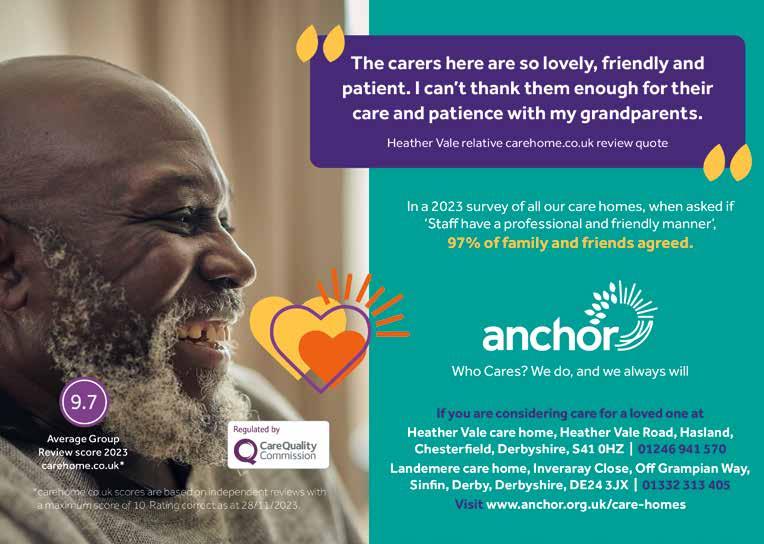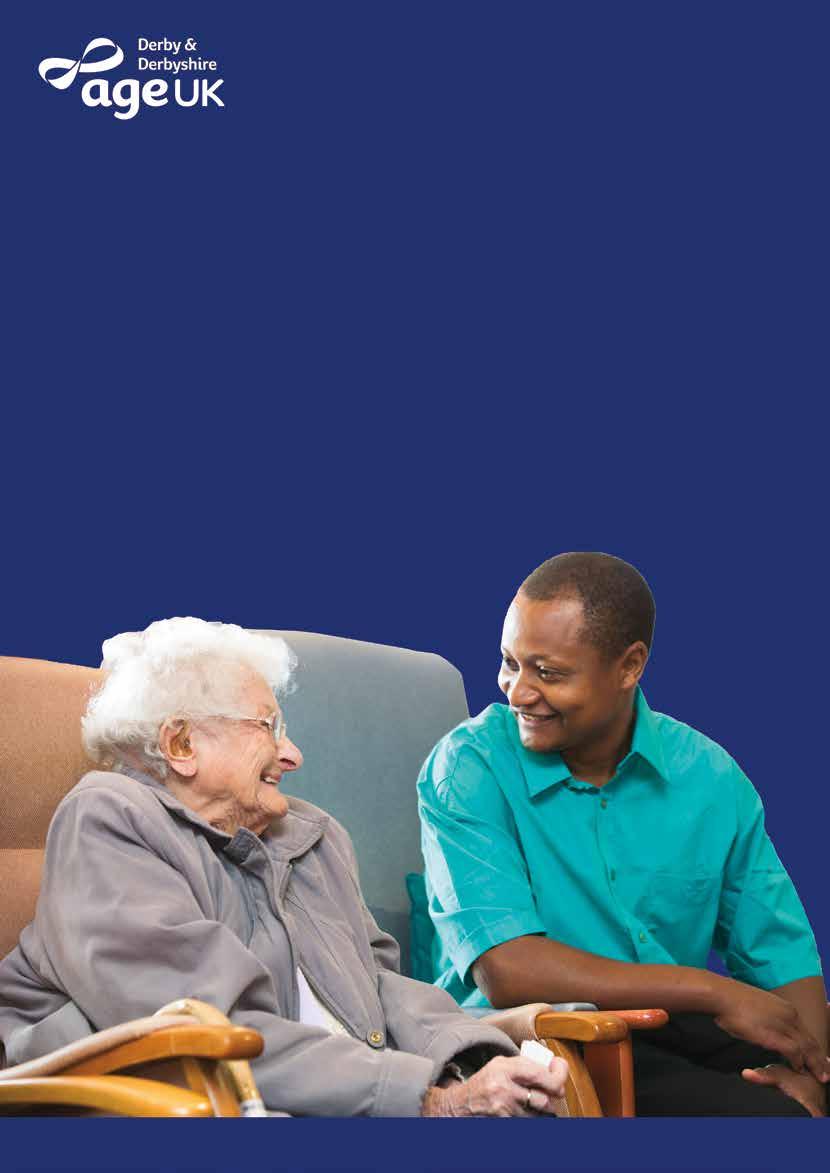A guide to care and independent living leave hospital When you
Personal budgets and direct payments
Preventing falls and trips
10 SOCIAL CARE
tips

Connecting with older people










‘It’s

A guide to care and independent living leave hospital When you
Personal budgets and direct payments
Preventing falls and trips
10 SOCIAL CARE
tips

Connecting with older people










‘It’s
us when you might get back to your own bed and comfy slippers!
Chesterfield Royal Hospital is encouraging patients to ask questions about when they might be able to get back to their own bed or favourite cuppa.
Getting patients home as soon as they are clinically ready to leave can be better for their wellbeing and recovery, so the hospital wants patients and their families to know ‘It’s Ok to Ask’ about when they might be ready to go home.
You might have seen the hospital’s Discharge campaign which follows a text message between a patient and their loved ones on subjects like, getting you home to your comfy slippers, or nothing better than a home cooked roast.
Although the campaign is focused on visitors and patients’ loved ones, patients can also help by following some easy steps:
• Setting an expected date for when they’ll be able to leave the hospital.
• Planning for transport home as soon as possible.
• Discussing any aids and adaptations they might need with their care teams.
• Ensuring the hospital’s checklist for discharge has been completed including the need for any prescription medicines being picked up.
‘It’s Ok to Ask’ about when they might be ready to go home.


“Home away from home”

• Accommodation for 26 residents
• For elderly people and people with Dementia
• 2 double rooms for couple sharing
• Group activities
• Long and short term respite care
• Palliative care
• Large landscaped gardens
• Local GP visits
Wood Lane, Hanbury, Burton-on-Trent DE13 8TG
Telephone: 01283 812 180
Email: ffch.admin@ffchltd.com
www.curagroup.co.uk/far-fillimore

“Premier nursing home”

• Accommodation for 40 residents all single rooms
– majority wet room en-suites
• Unrestricted visits
• All nursing requirements with speciality in palliative care
• Regular group activities and entertainment
• Within walking distance of shops and post office
• Local GP visits and On-site nurse
• Tuck shop
149 Stenson Road, Littleover, Derby DE23 1JJ
Telephone: 01332 760 140
Email: lnh.admin@ffchltd.com
www.curagroup.co.uk/littleover
“Warm, friendly and professional care homes”




If you’re experiencing anxiety or distress, there’s a Derbyshire helpline you can call that’s open 24 hours a day, seven days a week
Everyone feels sad or worried sometimes. For many older people, though, these feelings can become difficult to manage. They may be compounded by health problems, money worries or the loss of a partner or friend.
If you’re struggling to cope with your feelings and emotions, then why not call the freephone Derbyshire Mental Health Helpline and Support Service on 0800 028 0077?
This NHS-backed helpline is open round the clock to provide support to people of all ages. The expert advisers can offer help in a range of different ways –
whether that’s advising you on your mental health or talking through practical issues that may be causing you concern.
The helpline staff – who work for Derbyshire Healthcare NHS Foundation Trust, Derbyshire Federation for Mental Health and the charity P3 –speak to hundreds of Derby and Derbyshire residents every month. So why not give the helpline a go?
Call the Derbyshire Mental Health Helpline on 0800 028 0077
Learn more at www.derbyshirehelpline.com
Take advantage of a special online training course and video
Delirium is a physical condition that causes a person to become easily distracted and more confused than normal.
The advisor I spoke to was fantastic and understood my needs for phoning and helped me through a tough spot – helpline caller.
Delirium can be very distressing for the person and their family. If it is not caught early and treated, it can have serious consequences. There is growing research suggesting a strong link between Delirium episodes and the development of Dementia in older adults.
A special online training course and video has been created for Derbyshire that aims to increase
awareness of Delirium, and how to spot it and prevent it.
The training course can be found by typing in this address to your web browser: bit.ly/delirium-awareness
You can also find a link to the training course and watch the video on the Derbyshire Healthcare NHS Foundation Trust website. Click on ‘Get involved’ and then ‘Delirium awareness’. The direct link is www.derbyshirehealthcareft.nhs.uk/delirium
Derbyshire Healthcare NHS Foundation Trust is a specialist provider of mental health, learning disability, substance misuse and children’s health services – across community, inpatient and specialist settings in Derby and Derbyshire.

Some people with long-term complex health needs qualify for free social care arranged and funded solely by the NHS. This is known as NHS continuing healthcare.
Where can NHS continuing healthcare be provided?
NHS continuing healthcare can be provided in a variety of settings outside hospital, such as in your own home or in a care home.
NHS continuing healthcare is for adults. Children and young people may receive a “continuing care package” if they have needs arising from disability, accident or illness that cannot be met by existing universal or specialist services alone.
Find out more about the children and young people’s continuing care national framework on GOV.UK
You should be fully involved in the assessment process and kept informed, and have your views about your needs and support taken into account. Carers and family members should also be consulted where appropriate.
A decision about eligibility for a full assessment for NHS continuing healthcare should usually be made within 28 days of an initial assessment or request for a full assessment.
If you are not eligible for NHS continuing healthcare, you can be referred to your local council who can discuss with you whether you may be eligible for support from them.
If you still have some health needs then the NHS may pay for part of the package of support. This is sometimes known as a “joint package” of care.
Your eligibility for NHS continuing healthcare depends on your assessed needs, and not on any particular diagnosis or condition.
To be eligible for NHS continuing healthcare, you must be assessed by a team of healthcare professionals (a multidisciplinary team). The team will look at all your care needs and relate them to:
• what help you need
• how complex your needs are
• how intense your needs can be
• how unpredictable they are, including any risks to your health if the right care is not provided at the right time
Your eligibility for NHS continuing healthcare depends on your assessed needs, and not on any particular diagnosis or condition. If your needs change then your eligibility for NHS continuing healthcare may change.

The process involved in NHS continuing healthcare assessments can be complex. An organisation called Beacon gives free independent advice on NHS continuing healthcare.
Visit the Beacon website or call the free helpline on 0345 548 0300.

Integrated care boards, known as ICBs (the NHS organisations that commission local health services), must assess you for NHS continuing healthcare if it seems that you may need it.
For most people, there’s an initial checklist assessment, which is used to decide if you need a full assessment. However, if you need care urgently – for example, if you’re terminally ill – your assessment may be fast-tracked.
Being referred for a full assessment does not necessarily mean you’ll be eligible for NHS continuing healthcare. The purpose of the checklist is to enable anyone who might be eligible to have the opportunity for a full assessment.
The professional(s) completing the checklist should record in writing the reasons for their decision, and sign and date it. You should be given a copy of the completed checklist.
For most people, there’s an initial checklist assessment, which is used to decide if you need a full assessment.
The initial checklist assessment can be completed by a nurse, doctor, other healthcare professional or social worker. You should be told that you’re being assessed, and what the assessment involves.
Depending on the outcome of the checklist, you’ll either be told that you do not meet the criteria for a full assessment of NHS continuing healthcare and are therefore not eligible, or you’ll be referred for a full assessment of eligibility.
You can download a blank copy of the NHS continuing healthcare checklist from GOV.UK
Full assessments for NHS continuing healthcare are undertaken by a multidisciplinary team (MDT) made up of a minimum of 2 professionals from different healthcare professions. The MDT should usually include both health and social care professionals who are already involved in your care. You should be informed who is co-ordinating the NHS continuing healthcare assessment.

The team’s assessment will consider your needs under the following headings:
• breathing
• nutrition (food and drink)
• continence
• skin (including wounds and ulcers)
• mobility
• communication
• psychological and emotional needs
• cognition (understanding)
• behaviour
• drug therapies and medicine
If you’re eligible for NHS continuing healthcare, the next stage is to arrange a care and support package that meets your assessed needs.
• altered states of consciousness
• other significant care needs
These needs are given a weighting marked “priority”, “severe”, “high”, “moderate”, “low” or “no needs”.
If you have at least 1 priority need, or severe needs in at least 2 areas, you can usually expect to be eligible for NHS continuing healthcare.
You may also be eligible if you have a severe need in 1 area plus a number of other needs, or a number of high or moderate needs, depending on their nature, intensity, complexity or unpredictability.
In all cases, the overall need, and interactions between needs, will be taken into account, together with evidence from risk assessments, in deciding whether NHS continuing healthcare should be provided.
The assessment should take into account your views and the views of any carers you have. You should be given a copy of the decision documents, along with clear reasons for the decision.
You can download a blank copy of the NHS continuing healthcare decision support tool from GOV.UK
If your health is deteriorating quickly and you’re nearing the end of your life, you should be considered for the NHS continuing healthcare fast-track pathway, so that an appropriate care and support package can be put in place as soon as possible – usually within 48 hours.
If you’re eligible for NHS continuing healthcare, the next stage is to arrange a care and support package that meets your assessed needs.
Depending on your situation, different options could be suitable, including support in your own home and the option of a personal health budget.
If it’s agreed that a care home is the best option for you, there could be more than 1 local care home that’s suitable.
Your ICB should work collaboratively with you and consider your views when agreeing your care and support package and the setting where it will be provided. However, they can also take other factors into account, such as the cost and value for money of different options.

If your needs have changed, the review will also consider whether you’re still eligible for NHS continuing healthcare.
If you’re eligible for NHS continuing healthcare, your needs and support package will normally be reviewed within 3 months and thereafter at least annually. This review will consider whether your existing care and support package meets your assessed needs. If your needs have changed, the review will also consider whether you’re still eligible for NHS continuing healthcare.
ICBs will normally make a decision about eligibility for NHS continuing healthcare within 28 days of getting a completed checklist or request for a full assessment, unless there are circumstances beyond its control.
If the ICB decides you’re eligible, but takes longer than 28 days to decide this and the delay is unjustifiable,
I have a local authority support package that works well. I’m now eligible for NHS continuing healthcare – will my support package change?
If you’re concerned about changes to your care package because of a move to NHS continuing healthcare, your ICB should talk to you about ways that it can give you as much choice and control as possible. This could include the use of a personal health budget, with 1 option being a “direct payment for healthcare”.
Can I refuse an assessment for NHS continuing healthcare? If I refuse, will I be able to get services from my local authority?
Consent is not needed for completion of assessments (CHC Checklists, Decision Support Tools (inclusive of FNC by default) and Fast Track), or collation and sharing of information with:
• Care Teams
• Health and Social Care Staff
But consent is needed to share personal information collected for, and as part of, assessments (Checklist, Decision Support Tool (inclusive of FNC by default) and Fast Track) with third parties, such as family, friends or representatives, at the beginning of the process.
There is a legal limit to the types of services that a Local Authority can provide. If you have any concerns about being assessed for NHS continuing healthcare, the ICB should explore your reasons for this, and try to address your concerns.
they should refund any care costs from the 29th day until the date of their decision.
If you’re not eligible for NHS continuing healthcare, but you’re assessed as requiring nursing care in a care home (in other words, a care home that’s registered to provide nursing care) you’ll be eligible for NHS-funded nursing care.
This means that the NHS will pay a contribution towards the cost of your registered nursing care. NHS-funded nursing care is available irrespective of who is funding the rest of the care home fees.
Find out more about NHS continuing healthcare from NHS England.
If someone lacks the mental capacity to consent to sharing of information with third parties (other than Care Teams or Health and Social Care Staff), the principles of the Mental Capacity Act will apply and a best interests decision may be needed.
Q
My relative is in a care home and has become eligible for NHS continuing healthcare. The ICB says the fees charged by this care home are more than they would usually pay, and has proposed a move to a different care home. I think a move will have a negative effect on my relative. What can we do?
If there’s evidence that a move is likely to have a detrimental effect on your relative’s health or wellbeing, discuss this with the ICB. It will take your concerns into account when considering the most appropriate arrangements.
If the ICB decides to arrange an alternative placement, they should provide a reasonable choice of homes.
Q
Is it possible to pay top-up fees for NHS continuing healthcare?
No, it is not possible to top up NHS continuing healthcare packages, like you can with local authority care packages.
The only way that NHS continuing healthcare packages can be topped up privately is if you pay for additional private services on top of the services you’re assessed as needing from the NHS. These private services should be provided by different staff and preferably in a different setting.
Alzheimer’s Society wants everyone affected by dementia to know that whoever you are, whatever you are going through, you can turn to them for support, help and advice.
Dementia Connect, from Alzheimer’s Society, is a personalised support service for anyone with dementia, their carers, families and friends.
We understand that dementia affects everyone differently. So whether you, a loved one, a friend or neighbour needs dementia support, we’re here for you.
We’ll connect you to a whole range of dementia support, by phone, online and face to face. Our highlytrained dementia advisers can help people come to terms with their diagnosis and navigate the complicated maze of health and social care services.
It’s free, easy to access, and offers you the support you need. Whether it’s advice on legal documents, help understanding dementia or someone to talk to when things get tough, we’re here to help.
We can keep in touch with you to make sure you keep getting the support you need. And because we know it’s never easy to tell your story, you’ll only ever need to tell it to us once.
Our dementia advisers are available to talk to on the phone seven days a week. They will listen and give you the support and advice you need, including connecting you to help in your local area and online. We can offer you the option of regular calls so we can keep in touch, to find out how you are and help when things change.

*Calls charged at standard local rate.

Dementia Connect online support is available round the clock through our website. Answer a few simple questions about yourself, or someone you know, to get personalised, relevant information and advice. From guides on dementia to advice on making your home dementia friendly, get the information about the things that matter to you.
‘The Dementia Adviser was lovely and full of information. Without Alzheimer’s Society and the Dementia Adviser we’d have nothing. She is a major networker and knows everything and everyone local. I feel in charge and empowered.’ Katherine, living with dementia
If you need further support, you can request a call from our dementia advisers, who should be in touch with you within a week. Our online support includes Talking Point, our online community where you can connect with others in a similar situation, and our Dementia Directory where you can search for local services.
Where possible, our local dementia support workers can meet you in person to offer further support, advice and information. They will also connect you to other face to face services in your area, including local support groups.
Notes: Dementia Connect phone and online support is available wherever you live. As the service is new, some parts of the service may not be available in your area just yet.


You’ll be given a personal budget to spend if your local council decide you’re eligible for help with any social care and support you need. You can request an assessment from the council to establish your needs.
The money in your personal budget can be paid to you, to help you make more decisions about how it’s spent. This is known as a direct payment.
Your personal budget is the amount of money your local council will pay towards any social care and support you need.
The amount of money in your personal budget is decided by your local council after a needs assessment to work out:
• what kind of care and support you need
• how much it will cost
• how much you’re able to afford yourself
If you’re a carer, you may be entitled to receive a personal budget after having a carer’s assessment to see what might help make your life easier.
If you’re a carer, you may be entitled to receive a personal budget after having a carer’s assessment to see what might help make your life easier.
A carer’s assessment is free and anyone over 18 can ask for one.
You can ask the council to either:
• manage your personal budget for you
• pay the money to another organisation – such as a care provider
• pay the money directly to you or someone you choose – this is known as a direct payment
You can also choose a combination of these options. For example, the council could arrange some of your care but send you the rest of the money. This is often called a mixed package or “mix and match”.
If the council manages your money
The money in your personal budget will be spent for you by the council. They will arrange all your care and support based on your agreed care plan.
They still need to check you’re happy with the care they’re arranging for you.
If your money is paid to another organisation
The organisation you choose, such as your care provider, will speak to the council and arrange the payments.
Sometimes other organisations charge you extra money to arrange payments from the council.
Direct payments give you more flexibility over how your care and support is arranged and provided.
For example, you could choose to hire care workers or personal assistants who:
• are always the same people and available when you need them
• speak the same language as you
• have experience working with your care needs
• are a specific person that has been recommended to you
• can help you get to shops or social events

There are many ways you could choose to use the money. It’s your choice as long as you’re spending your personal budget on things that meet your agreed care plan.
Most councils will ask for evidence of how you’ve spent your money every 3 months.
You may decide direct payments are not helpful if:
You should be offered direct payments as an option after your needs assessment.
You can also ask your local council’s social services department about direct payments.
You could also consider having someone else manage your direct payments, for example a friend or family member.
• you’re worried about managing money or the people you employ
• you spend a lot of time in hospital
• you would rather the council arranged your care
If you’re not confident about keeping records or managing the people who care for you, your local council should be able to provide support.
You could also consider having someone else manage your direct payments, for example a friend or family member. You’ll need to set up a trust for payments that are managed by someone else.
The Money Advice Service has information about setting up a trust.
If you choose direct payments, the council will send you the money in your personal budget by either:
• paying it directly into a bank, Post Office, building society or National Savings and Investments account
• sending you a pre-paid card
You can then choose how you spend the money on your own care and support, as long as it matches the care plan you’ve agreed with the council.
The council might ask you to sign a document called a direct payment agreement. This says:
• how the council want you to record your spending –for example, keeping receipts

• your responsibilities as an employer - if you’re paying for a care worker
If you spend direct payments on something that isn’t agreed in your care plan, the council could take the money back or end the direct payments.
If you’re struggling to manage your money
Ask your local council for advice or call the Money Advice Service on 0800 138 7777.
If you want someone else to receive the direct payment
You could speak to the council and agree for the money to be sent to someone who will spend it for you. For example:
• a carer
When choosing an agency, decide what sort of service you’re looking for and the tasks you need help with.
• a friend or family member
• someone else who speaks up for you (an advocate)
You may need to write down how they will spend the money and which decisions they can make for you.
This is known as a decision-making agreement.
Employing your own carer or personal assistant
If you decide to hire a carer or personal assistant yourself, it’s important to know the responsibilities you’ll have as an employer.
Although support from the council should be available, you may need to arrange:
• background checks or references
• tax
• National Insurance
• pension contributions
Read more about employing someone to work in your home on GOV.UK.
Disability Rights UK also have more information on getting a personal assistant.
You could choose to hire care workers through an agency instead. This removes the legal obligations of being an employer, but could:
• cost you more money
• remove some of the benefits - such as having the same person provide your care
When choosing an agency, decide what sort of service you’re looking for and the tasks you need help with. It’s a good idea to contact more than one agency, as they may offer different types of services.
You can find out about local home care agencies by:
• speaking to your local council’s social services department
• contacting the UK Homecare Association

If you’re eligible for NHS-funded nursing care, the NHS will arrange and fund nursing care provided by registered nurses employed by the care home.
There are also organisations that inspect care agencies to see how well they are doing. The Care Quality Commission (CQC) regulates all health and adult social care in England.
You might see a CQC inspection rating when you search online for care home agencies. Their 4 ratings are:
• Outstanding
• Good
• Requires improvement
• Inadequate
You could also search for care home agencies on the CQC website to see their full reports.
If you would like support to help you manage your personal budget or direct payments, speak to your council or call:
• the Disability Rights UK personal budgets helpline on 0330 995 0404
• the Age UK advice line on 0800 055 6112 (for older people)
NHS-funded nursing care is when the NHS pays for the nursing care component of nursing home fees. The NHS pays a flat rate directly to the care home towards the cost of this nursing care.
Who is eligible for NHS-funded nursing care?
You may be eligible for NHS-funded nursing care if:
• you’re not eligible for NHS continuing healthcare but have been assessed as needing care from a registered nurse
• you live in a nursing home
You should be assessed for NHS continuing healthcare before a decision is made about whether you are eligible for NHS-funded nursing care.
Most people don’t need a separate assessment for NHS-funded nursing care. However, if you do need an assessment or you haven’t already had one, your integrated care board (ICB) can arrange an assessment for you.
If you’re eligible for NHS-funded nursing care, the NHS will arrange and fund nursing care provided
It’s worth speaking to your council’s social services before making an official complaint to see if they can help.
You still have to the right to complain if you:
• have been told you’re not eligible to receive money towards your care and support
• don’t agree with the amount of money in your personal budget
You could either:
• speak to your social worker about being re-assessed
• call your local council social services and request a complaints form
Your council should also have a formal complaints procedure on its website.
If you’re not happy with the council’s response
Contact your Local Government Ombudsman. They investigate all adult social care complaints.
• Age UK have a detailed fact sheet on personal budgets and direct payments in social care
• The Money Advice Service has a guide to direct payments
by registered nurses employed by the care home. Services provided by a registered nurse can include planning, supervising and monitoring nursing and healthcare tasks, as well as direct nursing care.
If you’re not eligible for NHS-funded nursing care and you don’t agree with the decision about your eligibility, ask your ICB to review the decision.
The cost of NHS-funded nursing care
NHS-funded nursing care is paid at the same rate across England. In May 2022, the rate was set at £209.19 a week (standard rate) and will be backdated to 1 April 2022.
If you moved into a care home before 1 October 2007, and you were on the previous high band, NHS-funded nursing care is paid at a higher rate. In May 2022, the higher rate was set at £287.78 a week and will be backdated to 1 April 2022. You’re entitled to continue on this rate unless:
• you no longer have nursing needs
• you no longer live in a care home that provides nursing
• your nursing needs have reduced and you’re no longer eligible for the high band, when you would change to the standard rate of £209.19 a week, or
• you become entitled to NHS continuing healthcare instead

The Care Quality Commission is here to make sure health and adult social care services including hospitals, home and residential care as well as GPs in England provide people with safe, effective, high-quality care. We publish independent inspection reports and ratings about services – information you can use when you’re choosing care for yourself, or a loved one.
You can use our website to search for services you might be interested in by geographical area, or by specialism. For example, a care home that might offer specialist care for someone who has dementia. We also welcome your feedback on the care you have received – good or bad. We use this information to help inform our inspections and can alert authorities including local social services, if there are safeguarding concerns about care being provided.
You can visit our website at www.cqc.org.uk to find our inspection reports, or share an experience of care. You can also call us to share an experience of care on 03000 61 61 61. Here are some tips to help you choose your care.
1 The Care Quality Commission (CQC) registers all care homes and home care agencies. You can find out which ones support specific groups of people, such as people with a learning disability or those living with dementia.
2 CQC’s Chief Inspector for Adult Social Care, Andrea Sutcliffe always uses ‘The Mum Test’: is a care home safe, caring, effective, responsive to people’s needs and well-led? In other words, is it good enough for my Mum (or anyone else I love and care for)?
3

4
Look for care homes and home care agencies where the staff involve people who use services and their families and carers, and treat individuals with compassion, kindness, dignity and respect
Whether you are being cared for in your own home or in a residential setting, the staff looking after you need to be skilled, kind and supportive. They should also be capable and confident in dealing with your particular needs. You should always feel that their support is helping you to live the life you want to.
5 A care home will be a home for you or your loved one. Residents should be treated as individuals with their likes and dislikes taken into account. Think about whether a home is close enough to family, friends, and community facilities
6
Look at how well-led and managed a home is. What does it have in place to ensure that it delivers high quality care? Does it promote meaningful activity and connect the home with the community?
7
8
If you or a loved one needs help with day-today care, you can contact your local council’s social services department. They will ‘make an assessment of your needs’ and depending on circumstances, may be able to help you access financial help. For more advice visit Age UK’s website www.ageuk.org.uk /home-and-care.
If you would like to organise your care yourself, you can find a care worker or personal assistant through an agency Your local social services department should be able to provide details of approved agencies.
9
CQC’s ratings will identify services as: Outstanding H Good ● Requires improvement ● Inadequate ●
For up-to-date information about planning, choosing and paying for care, visit NHS Choices.
https://www.nhs.uk/conditions/social-careand-support-guide/
Safeguarding adults who receive social care is everybody’s business. If you are concerned about the safety of a loved one receiving care, contact the service provider in the first instance. You can also contact social services at your local council. If you feel a crime has been committed, contact the police. You can share your safeguarding concerns with us on our website or contact our National Customer Services

The Care Quality Commission is here to make sure health and adult social care services including hospitals, home and residential care as well as GPs in England provide people with safe, effective, high-quality care.
We publish independent inspection reports and ratings about services – information you can use when you’re choosing care for yourself, or a loved one.
You can use our website to search for services you might be interested in by geographical area, or by specialism. For example, a care home that might offer specialist care for someone who has dementia.
We also welcome your feedback on the care you have received – good or bad. We use this information to help inform our inspections and can alert authorities including local social services, if there are safeguarding concerns about care being provided.
You can visit our website at www.cqc.org.uk to find our inspection reports, or share an experience of care. You can also call us to share an experience of care on 03000 61 61 61.
Here are some tips to help you choose your care.
GP Top tips
1 If you are new to an area you can find details of local GP services such as doctors’ practices, out-of-hours services and walkin centres in our online directory of care services www.cqc.org.uk/content/doctorsgps
2 You can search any of these services by the name of the service, a place name or your postcode at www.cqc.org.uk
3
4
After an inspection, CQC publishes its findings in a report on its website. You can use these reports to check and compare services in your area
There are already over 1,000 reports about GP practices published on the CQC website.
5 CQC launched its new-style inspection reports for GPs – looking at the five key areas SAFE, EFFECTIVE, CARING, RESPONSIVE and WELLLED – you can use the reports to compare local GPs and choose services.
6
You can also use these new style inspection reports to find out more about local services and choose the one that is best for your needs.
7
8
CQC rates all GPs to help people make choices about where they get treatment. This will be on a four-point scale:
9
CQC will also look at how specific population groups are treated and give a rating. For instance how well they serve: Mothers, children and young people, vulnerable older people (over 75s) and people with long-term conditions
People will be able to choose a GP service that rates highly on the areas that matter to them.
We welcome your feedback (good and bad) on the services you, or a loved one, receives from your GP. You can share information with us online at http://www.cqc.org.uk/share-yourexperience-finder or call us on 03000 61 61 61.
Telephone: 03000 616161 • Web: www.cqc.org.uk
/CareQualityCommission @CareQualityComm
Pharmacies can now treat people for seven conditions, which would have previously needed a GP appointment. The vast majority of pharmacists in Derbyshire are taking part in this scheme.
What is the scheme, what does it cover, and who will benefit? Here’s everything you need to know.
What is ‘Pharmacy First’?
Pharmacy First will enable pharmacists to supply medicines, including antibiotics and antivirals, to treat seven common health conditions without the need to visit a GP.
What are the seven common conditions?
• Sinusitis
• Sore throat
• Earache
• Infected insect bite
• Impetigo (a bacterial skin infection)
• Shingles
• Uncomplicated urinary tract infections in women.
How can I access this service?
You can get treatment for these conditions by walking into the pharmacy or contacting them via telephone or email. Other healthcare professionals might direct you to a pharmacy if they feel you need it.
What will happen when I arrive at the pharmacy?

Will I have to pay for medication if I need it?
Usual prescription charges will apply for the seven common conditions. Patients who were already exempt from prescription charges will still be exempt.
What if I still want to see my GP?
You can still choose to visit a GP if you wish. ‘Pharmacy
First’ offers alternative access for these seven conditions, and we encourage people to make the most of this service and to speak to the highly trained professionals in their local pharmacy.
How will this reduce NHS waiting times?
You can still choose to visit a GP if you wish.
The pharmacist will be able to speak to you privately in a separate consultation room. They may perform an examination or ask to access your medical records. The pharmacist will be able to recommend the best course of action for you, including issuing prescriptions for antibiotics or antivirals where necessary.
By reducing the number of people attending GP appointments for conditions that can now be treated at pharmacies, the scheme aims to free up 10 million GP appointments every year so GPs can focus on people with complex health conditions.
Scan here for more information on how your pharmacy can help you.

If you need support or medical assistance, our local health and care professionals are ready and waiting to provide you with the right help, at the right time, in the right place. All you need to know is which service best suits your needs. We have put together a guide to help you ‘think which service’ is right for you. By knowing where to go, you’ll get the right advice, support, and treatment as quickly as possible.
Choose self-care for coughs and colds, minor grazes, bruises, and headaches. You can also treat conditions such as cold sores, heartburn, mouth ulcers, constipation, and conjunctivitis at home.
Make sure to keep your medicine cabinet stocked with painkillers, rehydration and indigestion treatments, anti-diarrhoea medicine, antiseptic cream, and antihistamines, and a First Aid Kit.
Use NHS 111 if you or someone you’re with has a medical problem that isn’t life-threatening but requires immediate help. NHS 111 will get you assessed and directed to the right place 24/7, 365 days a year, without the wait times.
Your local pharmacy can help with things like skin rashes and allergies, medication advice, earache, urinary tract infections, sinusitis, sore throat, infected insect bites, impetigo, shingles, and much more. There is no need to make an appointment to visit a pharmacy, and most have private consultation rooms. Find a pharmacy near you by visiting the NHS website.

You should also see your GP for things like unexplained weight loss, constant tiredness, migraines, a new or growing mole, a persistent high fever, changes in bowel movements, and yellowing skin. You don’t always need to see a doctor if you are poorly, many local GP teams have a range of healthcare professionals who have specific skills and might be better suited to your needs than a doctor.
Urgent Treatment Centres can treat urgent non-lifethreatening issues, without the long wait in A&E.
An Urgent Treatment Centre can treat you for sprains, cuts, broken bones, wound infections, animal bites, minor head injuries, minor burns, and much more. Health professionals can refer you to your GP or A&E if needed.
Our five Urgent Treatment Centres are located in Derby Urgent Treatment Centre, Ripley Hospital, Buxton Hospital, Ilkeston Hospital and Whitworth Hospital. They are open from 8am-8pm 365 days a year.
Think Which Service is right for your health needs.
Antibiotics are not appropriate for most colds, coughs and sore throats as these conditions will get better by themselves. So a visit to the GP or pharmacist is not required, unless your condition is not improving or recurring.
A&E should only be used for life-threatening emergencies such as signs of a heart attack or stroke, sudden confusion, severe breathing difficulty, choking, heavy bleeding, severe injuries, seizure, and sudden rapid swelling.
Scan the QR code for more information:

Health and social care organisations in Derby and Derbyshire have worked together to develop a new confidential computer record to improve the care you receive.
Until now, each organisation providing your care has kept different sets of records, which may be duplicated or incomplete.
The Derbyshire Shared Care Record (DSCR) has changed all that by joining up different records to create a more comprehensive and up-todate record about you. Over time this will help improve the care you receive.
The DSCR went live in early 2022, after many months of preparation by local NHS and social care organisations.
Joining up different records, including GP, hospital and social care records, will help improve care and avoid
situations where individuals have to repeat the same details about their care to each professional they see. It is only used for direct care.
Jim Austin, digital senior responsible officer for Joined Up Care Derbyshire, said: “It means that health and social care professionals working across Derby and Derbyshire’s NHS and local authority organisations are able to access the same, appropriate information to support the care of individuals.
“This is completely confidential and secure. It’s designed to help doctors, nurses and other health and social care professionals directly involved in an individual’s care to make better, safer decisions ”
Health and social care organisations for Derby and Derbyshire participating in the Derbyshire Shared Care Record, include: Derby City Council, Derbyshire County Council, Chesterfield Royal Hospital, University Hospitals of Derby and Burton, Derbyshire Healthcare, DHU Healthcare, Derbyshire Community Health Services, One Medical Group and primary care/GP services.
If you would like to learn more about the Derbyshire Shared Care Record please check out this web page: https:// joinedupcarederbyshire.co.uk/ your-services/derbyshire-sharedcare-record/
A shared care record means:
A shared care record means:
Peter is brought into A&E unconscious after a car accident. But wait!
Wouldn’t it be better if emergency staff knew he was allergic to penicillin, had a stroke three years ago and is the carer for his autistic sister? By having access to his shared care records, wrong medicines are less likely to be given, fewer tests are needed thanks to knowledge of his medical history and care can be organised for his dependants.
Rita is discharged from hospital. But wait! When the community matron visits wouldn’t it be better if she knew why Rita’s medication had changed, whether a care package has been arranged or that a conversation has taken place about her end-of-life care wishes. Having access to her shared care record means medicines can be reviewed and explained and care visits arranged efficiently.
A shared care record means:
Tom’s carer calls round and wonders why there is no answer. But wait!
Wouldn’t it be better if Tom’s carer knew his GP had already sent him to hospital so there was no need to call. It means carers have peace of mind and no unnecessary worry about why a patient isn’t answering the door.

We empower, care and engage with older people to make later life better.
Our name is nationally recognised but we are a local, independent charity. Every day our work makes a difference to older people and carers.
Our organisation involves older people in everything we do and volunteers give their time to help us deliver more for less.
We rely on donations and every penny we receive is spent in Derbyshire. And all our services, shops and fundraising need volunteers so come and join us.
When I first met Mary she seemed a bundle of illnesses and conditions. It was hard to see her for all the labels. ‘Dementia’, ‘depression’, ‘arthritis’, ‘falls risk’…. But somewhere under all the labels Mary was still there we just had to find her.
Her husband Jim was very anxious and feeling guilty that first trial day. Mary sat with her head down, until the music started that is! Then Mary’s new label was ‘beautiful voice’. At lunchtime she got another new label: ‘loves pudding!’ Craft got her fingers sticky and her mind working and she talked so her new companions gave her another label: ‘funny’. When Jim collected her and discovered our staff did not label her ‘difficult’ he breathed a sigh of relief.
Mary’s labels got more and more about her and less and less about her physical and mental health. Her regular falls prevention activity and empowering care meant she could move better at home too. Each visit got easier for Jim and something to look forward to for Mary. She started to label the day at Bakewell ‘my day’ and Jim could call it ‘his day’ and they got along better on all the other days.
When things got difficult Jim had experienced, skilled staff to turn to for advice and Mary had carers who knew her not her labels. With a door to door service and everything included in the price it was great value for money.
As you’d expect our care carried on even in a pandemic and the day centre opened again with effective Covid-secure measures in place where Mary’s new label was ‘so glad to be back’
If you, or someone you love, would like to join our Day Services in Bakewell, Hope and Hulland Ward call Alison Milner on 01773 766922
For the people who use our Chaddesden Centre it a big part of their lives. The centre is a place they volunteer, learn, share, dance, sing and feel alive again. Our Chaddesden Centre provides a very popular weekly home-cooked meal for the lunch club, delivers and supports social groups, classes, and special activities and events. The activities are low cost but high value and delivered in a friendly, accessible centre in the beautiful Chaddesden park.
Come along to one of our events, sign up for a class or volunteer and find out what the Chaddesden Centre could mean to you.









hoffice@onlycareltd.com





Bramble Lodge: Residential and Dementia Care
Bramble Lodge is situated within scenic gardens in West Hallam, Derbyshire. Bramble Lodge has established an enviable reputation for providing high quality care in a homely environment by placing the comfort of our residents as our priority. We ensure that a good quality of life is maintained through activities and social events, combined with excellent facilities and personalised care planning.
82 High Lane West, West Hallam, Derbyshire DE7 6HQ 0115 944 4545 • bl@onlycareltd.com
Hollybank House: Nursing & Residential Care
Hollybank House is a delightful Nursing and Residential care home, housed over 2 floors and set in the beautiful countryside of Oakerthorpe, Derbyshire. Many of the rooms are en-suite and all are decorated and furnished to a modern, but homely style. The Home is set off the main Chesterfield Road and has good transport links available. It is surrounded by majestic gardens and large woodland areas.
Chesterfield Road, Oakerthorpe, Alfreton Derbyshire, DE55 7LP 01773 831 791 • hh@onlycareltd.com
Blackwell Care Home: Nursing & Residential Care
Blackwell Care Home offers spacious accommodation with all private single en-suite rooms with the exception of two shared rooms designed for married couples. All rooms are beautifully decorated and have TV and telephone points. Bedrooms are fully furnished but residents are more than welcome to personalise the bedrooms to make it feel like home away from home.
Blackwell Care Home, Gloves Lane, Blackwell, Derbyshire, DE55 5JJ 01773 863 388 • bw@onlycareltd.com
Ashcroft Care Home: Nursing, Residential & Dementia Care
Ashcroft is a state of the art care home which offers the latest in luxurious living: the home has its own tea room, hair salon, massage and pamper parlour. All bedrooms have en-suite facilities. What’s more, the home is just a short walk from the town centre and leisure parks. Life in Ashcroft is about helping our service users to enjoy more independent and fulfilling lives.
Langton Road, Sutton-in-Ashfield, Nottinghamshire NG17 1ER 01623 444780
• ac@onlycareltd.com
Willowcroft Care Home: Mental Health Care
Willowcroft strives to improve the life of service users so that they can lead an independent and fulfilling life. All bedrooms have en-suite facilities. We work closely with market leaders in the architectural and design industries to create home environments that enable people who are living with Mental Health Conditions and Dementia to find their way around independently.
New Street, Sutton-in-Ashfield, Nottinghamshire NG17 1BW 01623 703320
• wc@onlycareltd.com